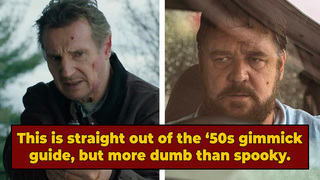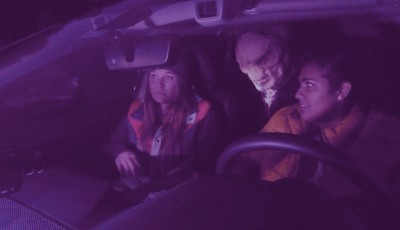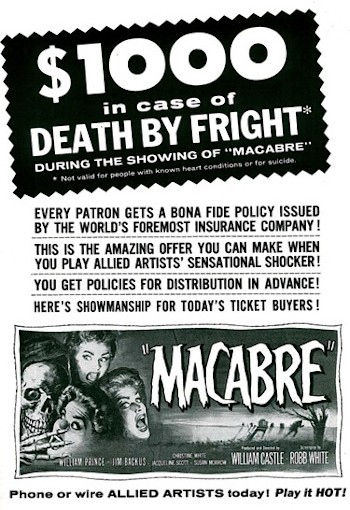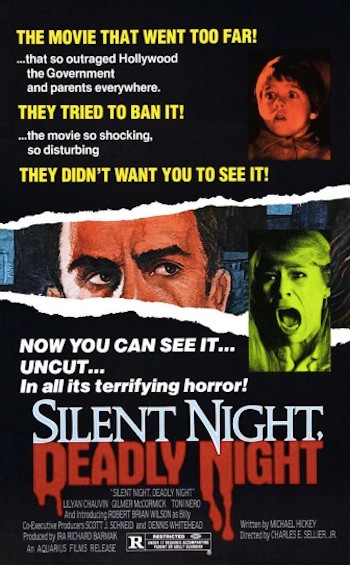Conservative Movies May Start Aping Old-School Horror Gimmicks

Right now obviously isn't the best time to be in the movie theater business. Cinemas across the world are still closed, and those that are open have been forced to either show old films, or whatever new movies aren't good enough to delay until next year, like The New Mutants, or that one where Academy Award-winner Robert DeNiro comically abuses his bloodthirsty grandson.
So how do you sell the idea of going to the movies during a pandemic, which experts say is not actually a safe thing to do? AMC has been leaning heavily on the concept of nostalgia in their promotional efforts. When they first re-opened, AMC celebrated their hundredth year in business by offering tickets at "1920 prices" -- a quaint stunt that inadvertently called to mind that other pandemic that decimated the movie industry.
Don't Miss
But on the whole, the COVID-era of movie-going has had a distinctly 1950s vibe, mostly due to the resurgence in popularity of the drive-in theater -- the preferred cinematic venue for both auto enthusiasts and serial masturbators. While the first drive-ins opened as early as in the 1910s, it wasn't until the post-World War II era that they really took off. In the '50s, drive-ins were a popular hub for families, horny teenagers, and families inadvertently created by horny teenagers.
This past summer, drive-ins made a big comeback since most indoor theatres were closed. Not only were drive-ins popular among consumers, but film festivals and movie premieres were forced to incorporate drive-in options. Plus, the notoriously fussy Academy of Motion Picture Arts and Sciences modified their eligibility requirements to include drive-in screenings.
The 1950s also saw the proliferation of the movie gimmick; theatrical stunts meant to entice audiences to theatres and away from their newfangled home television sets. The king of the movie gimmick was the great William Castle, who had all kinds of crazy ideas to promote his horror movies: a "punishment poll" in which the audience voted on the outcome of Mr. Sardonicus, joy buzzers rigged in random seats during The Tingler, and an "Emergo" a plastic skeleton who would emerge from the screen at the end of The House on Haunted Hill to the audience's ... um, terror?
Movie gimmicks may be making a comeback in 2020, too. With a paltry release roster, many drive-ins are using the Halloween season to stage "haunted" screenings of horror movies, in which actors in spooky costumes will randomly freak out patrons. Hopefully, it will all occur outdoors, and not, as one drive-in advertised, with some rando breaking into your goddamn car.

From a financial standpoint, theatrical releases are relying on the gimmicks that we already have in place to make money. Take the recent Liam Neeson movie Honest Thief, AKA Vicarious Divorced Dad Adventure 17. According to the film's distributor, they're specifically counting on four "premium" formats to make a little extra dough to make up for the lean attendance: IMAX, Dolby Vision, D-Box, and 4DX. The latter is the true heir to the '50s gimmick crown, promising "a new movie-watching paradigm for the five senses." Meaning that audiences will have to brave the possible health risks to pay extra to sit in a gyrating hydraulic chair while being sprayed in the face with aerosols containing Liam Neeson's aftershave.
Then there's Unhinged, the bonkers thriller in which Russell Crowe terrorizes a woman who had the unmitigated gall to honk at him in traffic. It's arguably Crowe's most unpleasant performance, even including the roles that required singing. As we've mentioned before, the Unhinged PR department tried to turn the negative of seeing a movie in a room where you're sharing air with strangers who routinely de-mask to shove a fistful of Milk Duds into their potentially germ-filled faces into a plus. How? By making going to see Unhinged into some kind of badass feat of strength for thrill-seekers, offering virtual badges to those who somehow conquered their fears and sat motionless for 90 minutes watching Russell Crowe go crazy. Hopefully, they give you extra badges if it turns out that someone in your screening actually had COVID.
It would be nice if we could see this dumbass stunt as totally apolitical, but as frustrating as it may be, adhering to health and safety guidelines has become a political issue. Even AMC made this abundantly clear when they initially refused to enforce mandatory masking in theaters for fear of creating a "political controversy" -- thus inadvertently sparking a political controversy that forced them to reverse their decision.
And it's not a stretch to view Unhinged as in-line with the American right-wing. It was penned by the same screenwriter behind the 2012 remake of the '80s paranoid Republican fantasy Red Dawn and, without spoiling the end, Unhinged ultimately offers up the retrograde moral that women should just keep their thoughts and feelings to themselves. Or, as the Hollywood Reporter put it in their review: "Women should carefully avoid triggering violent misogynists into venting their White Male Rage." This "We saw a movie in a fucking theater!" marketing strategy falls in line with President Trump's recent comments to not let the coronavirus "dominate" your life ... shortly after he was airlifted to the hospital.
Goading audiences into cinemas with the enticement of overcoming fear also seems straight out of the 1950s gimmick handbook. It recalls one of Castle's earliest promotions; for the movie Macabre, he offered each attendee a life insurance policy that would pay $1000 "in the event of the death by fright of any member of the audience during the performance." He also stationed fake nurses inside the theater and parked a horse-drawn hearse outside.

With the industry struggling and movie-going safety still in question, we wouldn't be surprised if this politicization of fear-based advertising only increases until an effective vaccine arrives. We could easily see, say, the release of the new Michael Bay fueling some kind of dick-measuring publicity stunt that rewards the machismo of attending a screening with complimentary polyester t-shirts or fanny packs.
It's not uncommon for conservative-leaning movies to borrow marketing strategies from old school horror. Recently the (easily debunkable) anti-abortion drama Unplanned sold itself partly by manufacturing a controversy. It promoted the narrative that they were exposing a truth that had been "buried" and silenced by mainstream film critics whose outlets "wouldn't report" on its release.
But as it turned out, the producers of Unplanned simply never arranged any screenings or screener links for critics to watch in the U.S.A. and Canada. But using a controversy (in this case a false one) to generate publicity an old horror movie standby. Like with Silent Night, Deadly Night, the '80s slasher flick about a killer dressed as a Santa Claus. It was protested by angry parents, pulled from theaters, and the filmmakers were even publicly shamed by Siskel & Ebert. The result? The crappy movie that likely would have been immediately forgotten by society as a whole became a modest hit and spawned four sequels. When it was re-released, the poster boldly proclaimed that it was the movie that "THEY DIDN'T WANT YOU TO SEE."

Similarly, the John Travolta crapfest Gotti responded to its 0% score on Rotten Tomatoes by claiming that "critics don't want you to see it" -- which immediately drew comparisons to Trump's attacks on the press. And in retrospect, that same mentality anticipated the President's antipathy towards scientific experts this year, proving that the Gotti marketing strategy is even worse when applied to a pandemic instead of just a dumb MoviePass-produced vanity project.
By their very definition, exploitation movies are designed to exploit and capitalize on "some timely or currently controversial subject." Mid-budget movies like Unhinged may continue to go the exploitation route -- not with their films' actual subject, but with the context of their release. Any movie that promotes a purely theatrical release right now will be wading into potential controversy, although some people are actively making strides in the opposite direction. Filmmakers Aaron Moorhead and Justin Benson actually issued a statement encouraging audiences not to go see their new film Synchronic in indoor cinemas, despite the fact that it is getting a full theatrical release. While that seems to be an atypical act of selflessness, we wouldn't be surprised if we got more movies like Unhinged, which are content to turn the issue of health into a cultural battleground, and the business of film advertising into the equivalent of a fourth grader's schoolyard dare.
You (yes, you) should follow JM on Twitter! And check out the podcast Rewatchability
Top Image: